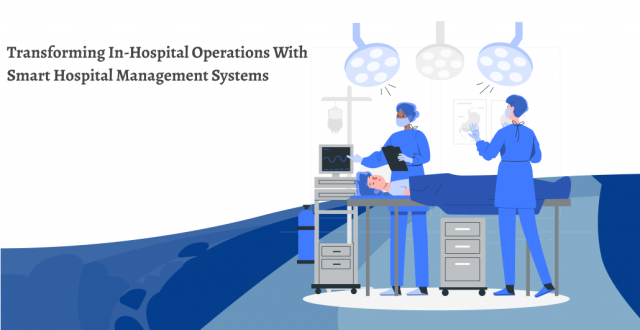Replacement of hospital in-hospital procedures with smart hospital management systems is revolutionizing the health care sector. These newer systems make administrative processes easier, improve patient care, and overall efficiency. Right from appointment booking to on-the-spot availability of information, smart systems facilitate effortless coordination among departments. Clinic management systems also facilitate outpatient centers, simplifying processes and improving patient satisfaction. Hospitals and clinics can offer faster, smarter, and more dependable health care services with these integrated technologies.
What is a Smart Hospital Management System?
Smart Hospital Management System is web-based next-gen system that will attempt to automate and make each phase of the process of operating a hospital automated, provide real-time access to information, and make smart decisions. Compared to the conventional systems in which separate hospital management system modules like patient registration, billing, labs, pharmacy, radiology, etc. are conducted separately, the smart HMS will combine all such HMMS modules in a single interactive interface.
One of the smartest Hospital Management System examples is its hospital queue management system that reduces patient waiting time and overall experience by improving appointment scheduling, walk-ins, and consultations. It enables hospitals to optimize patient flow, dynamically resource, and increase staff productivity without leading to overcrowding and mess.
The Hospital Management System is also fully compatible with IoT devices, telemedicine devices, and electronic health records (EHR) as well as free flow of information between departments. It helps to enable real-time viewing of patient histories by clinicians, remote monitoring, as well as quick and accurate diagnosis. AI and analytics applications also assist in forecasting patient demand, automating resource assignment, and enhancing clinical outcomes.
In essence, the Smart Hospital Management System transforms a hospital into an efficient, data-based facility. It reduces human interventions, promotes coordination, and facilitates high-quality delivery of services. With bulletproof architecture and modularity, it allows hospitals to keep pace with lightning-speed technology advancements as well as delivering patient-centric services.
Key Challenges in Traditional Hospital Operations
The traditional hospital processes generally have major issues that discourage efficiency and quality of care. Paper-based, time-consuming, and error-susceptible patient registration, appointment scheduling, and medical record management are the norm. Such inefficiencies commonly lead to delayed treatment, interdepartmental communication breakdowns, and substandard patient experience.
Maybe the most crucial problem is an inept coordination between different departments of a hospital such as pharmacy, laboratory, and radiology. This inept coordination will slow down the process and can lead to delayed diagnosis or treatment. Stocking up or shortage of essential supplies, which are proportional to the patients, is also due to inventory control.
The majority of the hospitals in India are also operating on old systems, despite increased awareness about digital transformation. Implementation of a hospital management system in India will help avert most of such issues by making them automated and more accurate. Low awareness, insufficient funds, and inadequate trained staff have been the hindrances.
A hospital management system can be chosen economically and with convenience, and therefore can be the option. The advantages of the hospital management system are the ability to gather information from a single source, less administrative time, and streamlined processes. Hospitals must employ advanced Hospital Management Software In India specifically designed to cater to the needs of a local environment and healthcare trends if in-patient treatment must become genuinely enhanced.
Technologies Driving Smart HMS
HMS evolution within the healthcare sector has been driven by upcoming technology. Hospital management systems in the current era are more converged, smarter, and intent on meeting mounting demands for efficiency and quality of care. All these developments are transforming the operation of hospitals, especially in India's new economies, where digitization is overdue.
Cloud computing is also one of the enabling technologies for smart HMS in India. Through cloud infrastructures, patient and precious resource information would be remotely accessed from anywhere by the hospitals easily, enabling simple remote monitoring and coordination. It functions quite well with rural location hospitals and health centers.
Artificial Intelligence (AI) and Machine Learning (ML) are also playing important roles by offering predictive analysis, computer-aided diagnosis, and personalized treatment plans. Internet of Things (IoT) is also helping to monitor medical devices in real-time, patient physiological parameters, and usage of resources in order to keep the overall hospital efficiency optimal.
Mobile connectivity and telemedicine integration are now integrated into the hospital management system module of modern hospitals in a way that allows patients to schedule appointments, see reports, and interact with virtual doctors.
Hospitals going hugely digital, embracing advanced hospital management system India solutions are becoming revolutionary, simplifying procedures and providing improved patient care through smart, technology-driven functionalities.
Benefits of Smart HMS Implementation
Implementing a Smart Hospital Management System (HMS) has some advantages, which have direct implications on the provision of healthcare quality and operational efficiency. Digitization and automation help in overcoming traditional limitations of the new HMS age for the healthcare sector.
One of the most important benefits is efficient administrative processes. Registration of patients to discharge and billing, intelligent HMS streamlines laborious processes, avoiding time wastage and mistakes. It allows healthcare professionals to have more time to treat and less time doing paperwork.
One of the best advantages is instant access to information. Doctors and healthcare professionals have instant access to patient history, lab reports, and medications, allowing quicker and more informed decision-making. Also, communication with radiology, labs, and pharmacies reduces organizational inefficiency.
In the Indian Hospital Management System Software scenario, they are achieving a special value regarding where they can satisfy the needs of those full hospitals and money-strapped clinics. They vary in size of hospital, shrewd HMS therefore perfectly suited to be employed even for a small-sized medium-sized medical centre.
For small clinics and practices, similarly, the clinic management systems offer an off-the-shelf solution for scheduling appointments, managing medical records, and billing simultaneously.
Typically, the smart HMS deployment results in enhanced management of resources, enhanced patient satisfaction, and enhanced health outcomes.
Conclusion
Briefly speaking, hospital modernization in the hospital is necessary to provide quality, patient-centric care. By lessening administrative burden, providing better data quality, and triggering greater interdepartmental coordination, intelligent HMS enables the health care givers to provide better. With HMS in India and worldwide progressing from strength to strength, deploying such technologies keeps the hospitals well ahead in providing quality, technologically enabled health care services.






